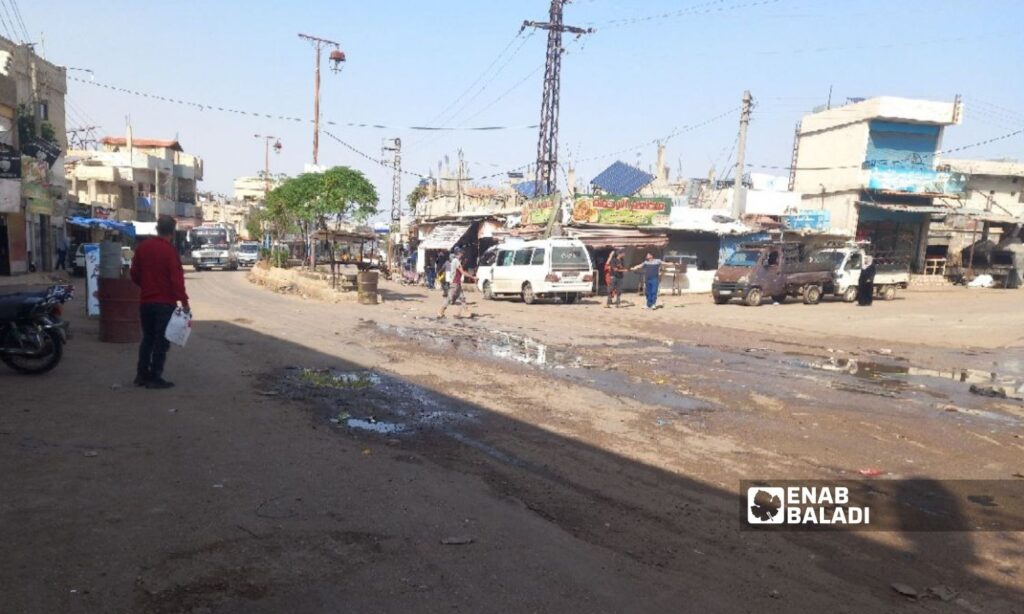Daraa – Halim Muhammad
Daraa’s residents suffer from the lack of public transportation that connects their southern governorate to the capital, Damascus, due to the high fuel prices and the tendency of some transportation owners to sell their fuel allocations in search of a better economic feasibility than that offered by “transportation business.”
The transportation dilemma pushed many university students to think seriously about changing their study fields in order to move to the branches of Damascus University available in Daraa, or to suspend university registration, in order to get rid of the difficulties facing students studying outside their governorate, such as providing a place of residence, which ranges from dilapidated university housing that is difficult to obtain and high rents that do not match the abilities of students who take their personal expenses from their families, in addition to the requirements of living as well.
Homelessness among university students
Ammar is a university student at the Faculty of Electrical Engineering in Damascus. His efforts to get a room in the university dormitory, in partnership with a group of other students, of course, were unsuccessful, forcing him to travel between Daraa and Damascus on a daily basis, incurring transportation fees that turned into a heavy financial burden on the family with the continuation of the situation.
The young man pays seven thousand Syrian pounds for a transportation fee from the Daraa bus station to the Damascus garage, preceded by additional fees to move from his home in the countryside of Daraa to the Daraa bus station, as well as transportation fees in Damascus as well.
Ammar told Enab Baladi, “I need about 20,000 Syrian pounds per day, in addition to the hardship of traveling and waiting for hours until a bus leaves for Damascus or vice versa.”
These costs are associated with the low purchasing power of Syrian citizens within the regime-controlled areas, in addition to the depreciation of the local currency (the Syrian pound) against the US dollar, as the price of one dollar reached 5170 SYP (at the time of editing this article).
The young man pointed out, during his speech, to the selective pricing done by bus and other transportation means’ drivers in the absence of oversight that unifies and controls prices while leaving them subject to fluctuations according to fuel prices.
The price of a liter of diesel in the local black market reached 6500 SYP, and a liter of gasoline reached 10,000 pounds.
Public buses in the town of Muzayrib in the western countryside of Daraa – 27 October 2022 (Enab Baladi/Halim Muhammad)
Mounting fare
The transportation fare from the main bus station of Daraa to Damascus is 2300 Syrian pounds, according to state leaflets.
Last May, the regime’s Ministry of Internal Trade and Consumer Protection issued a circular approving the kilometer tariff for transport companies between governorates.
The tariff was set at 32 pounds per kilometer for a businessman bus (30 passengers) and 29 pounds for a 45-passenger bus.
A move that the ministry attributed at the time to the high prices of car oil and its supplies, spare parts, and tires, in addition to the failure to secure fuels in the required manner, according to what was reported by the official Syrian News Agency (SANA).
Mohammad, a taxi driver, receives 25,000 pounds for each passenger from Daraa to Damascus, justifying this by the high prices of unsubsidized gasoline in the local market and the high maintenance fees, tire replacement, and others.
He told Enab Baladi that some drivers of “big buses and taxis sell their state-subsidized fuel allowances instead of working, which has caused a scarcity of public transportation.
Limited solutions, poor dormitory
The people of Daraa governorate prefer to register in the branches of Damascus University in Daraa governorate in order to alleviate the suffering of transportation and the misery of securing housing.
However, the available faculties are limited to education, literature, law, economics, veterinary medicine, and science, in the absence of other branches such as medicine, pharmacy, engineering, physics, and chemistry.
Faced with this situation, the student Ahmed was forced to stop his studies at the Faculty of Chemistry in order to move to study within his governorate, sacrificing an entire academic year he spent in Damascus.
During Ammar’s search for a house to rent in Damascus, after his attempts to obtain university housing failed, the young man ran into high monthly rent prices, with the owner of the house demanding six months’ rent in advance.
At the same time, university housing is not a comfortable option for students, as Iman, 28, preferred to suspend her university studies at the Department of French Literature because she was unable to rent a house in Damascus and was repulsed by the idea of university housing, and despite the presence of a branch of French literature in Daraa, It has been suspended since 2014, due to a shortage of teaching staff.
Faced with the lack of options, other students are forced to resort to university housing without high hopes for a comfortable climate for residence or study.
After a series of procedures to get space in the university dormitory, students suffer from the problems of stifling overcrowding within a room that can accommodate more than six or seven people.
At the same time, the dormitory buildings lack the minimum requirements of life due to the deterioration of public facilities and the absence of any real maintenance, especially with regard to heating, showers that do not provide hot water for a long time, and toilets unfit for human use, which puts students in the morning in search for a bathroom that can be used before going to school, in a situation that has been going on for years without any serious official moves to end the suffering of the students.











